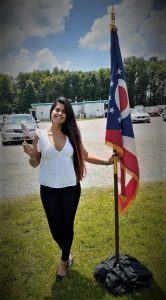Happy 4th of July to our newest citizen
Dasyl D’Cunha, assessments manager in Children’s Services, is the first in her Indian family to become a U.S. citizen. Her naturalization ceremony took place this week.
Dasyl is originally from Mumbai (formerly called Bombay). She came to Cincinnati in 2014 to pursue her master’s degree at the University of Cincinnati. UC’s criminal justice program is highly regarded, she said, and UC responded to her before her other school of choice (the University of Maryland) and with a better scholarship offer.
She had been living in the United States with a Green Card, making her a permanent resident. There’s a window of eligibility for citizenship and Dasyl said she “realized that I liked the life I had built here with school and work…and felt there was no going back.” She met her husband while they were both in graduate school at UC.
The test wasn’t difficult, she said, but it did involve a lot of memorizing “a different nation’s history – which, thankfully, I find interesting.” She studied for weeks. Her husband quizzed her as they did chores around the house. She said she wishes she had a dollar for every time her husband admitted he didn’t know the answer to a question about his own country’s history.
She’s excited about her new citizenship, but also feels a bit melancholic and nostalgic about no longer being a citizen of India. It “pricked a little,” she said, when she saw her citizenship certificate and it said “country of former nationality – INDIA.”
“I texted and sent updates and pictures to my family back home throughout so they could feel a part of this as much as possible,” she said. “They’re extremely happy and very proud of me, especially since I’m the first in the family to do this, to leave home and restart in a foreign country and then become a citizen of that country.”
It’s not uncommon for young adults to leave India for further education, she said, and then work in another country.
“But that doesn’t usually lead to citizenship,” she said. “They typically work on a work visa for decades and then wait 8 to 10 years for a Green Card and that’s usually where they stop or they return to their original country for retirement. The citizenship aspect is definitely a first and is unprecedented in my family and relative/friends circle.”
She’s looking forward to exercising her “privilege/right/responsibility” to vote, she said, and she thinks working on her doctorate might come with more resources now that she will no longer be considered an international student.
